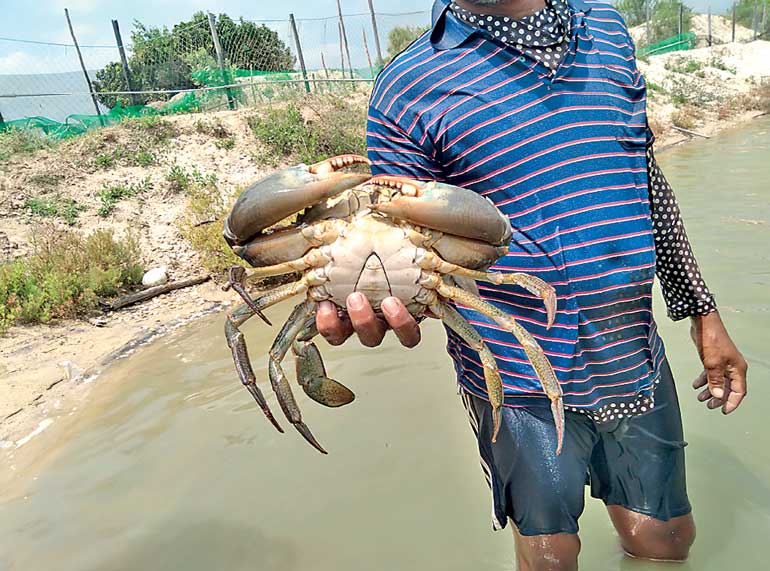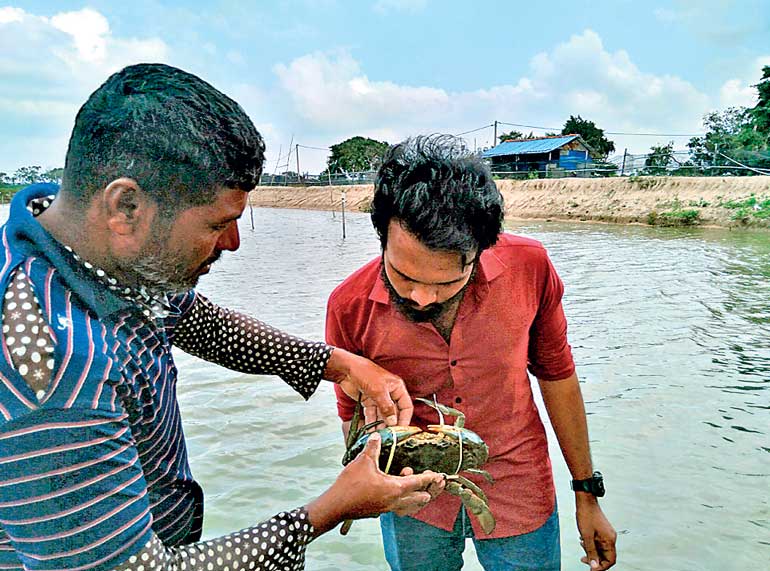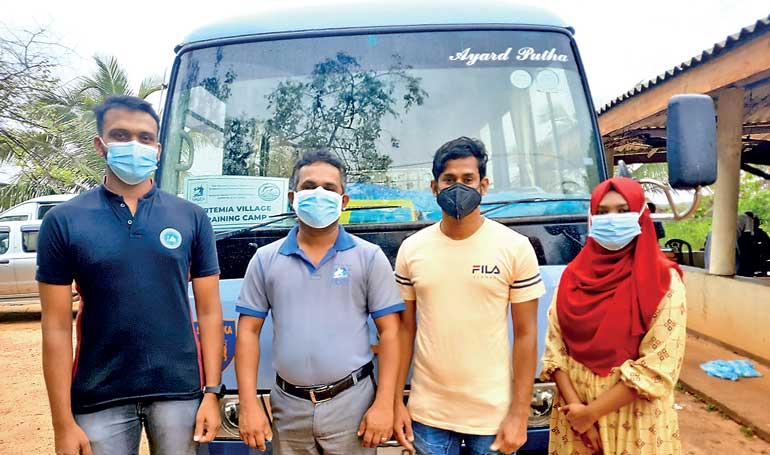Monday Feb 23, 2026
Monday Feb 23, 2026
Tuesday, 23 November 2021 03:11 - - {{hitsCtrl.values.hits}}

AEIOU training practical sessions
|
Munawwar holds a AEIOU farmed crab during aquaculture farm visits
|
Purest Group is an agriculture consultancy firm based in Puttalam that is driven by the mission to revolutionise agriculture and aquaculture in Sri Lanka by unlocking its growth and harvest potential – in terms of quality, size and standards – through organic and innovative means. Its ultimate vision is to solve food-related crises and shortages by harnessing biotechnology and specifically, food production technology, for sustainable mass production practices.
Purest Group’s chief initiative is the AEIOU project which is currently disrupting the country’s crab farming sector. The revolutionary project has been successful thus far in maximising crab harvest upto four times its usual output, reaching potentials of up to one kg from the previous 250g per crab. Purest Group is now ready to implement this system across farms islandwide.
With a dedicated mission to proliferate the crab farming community in our island nation, Purest Group is supported both technically and financially through HackaDev; the United Nations Development Programme (UNDP) in Sri Lanka’s flagship youth and innovation programme, which empowers Sri Lanka’s youth to be more innovative and entrepreneurial and take leadership in solving the most pressing development challenges in a sustainable manner, by providing them with opportunities and the necessary next-generation skills.
The HackaDev Enterprise Support Programme (HESP) is an initiative which is aimed at rebuilding enterprises and empowering entrepreneurs of the HackaDev alumni network affected by the COVID-19 pandemic. With the first cohort successfully implemented in 2020/21, it provided six months of comprehensive further development support to 15 enterprises. Curve Up was entrusted as the expert service provider to manage the seed funding and incubation support process of the HESP interventions, who were successful in providing necessary support and hands on guidance to entrepreneurs in their journey, contributing to the successful completion of the program.
Industrial crab farming came to the spotlight in Sri Lanka following the surge in global demand for crabs since 2010. With a 5.05% YOY growth, as estimated by the Food and Agriculture Organisation, the crab farming industry doesn’t seem to be slowing down any time soon and offers a great promise now more than ever, especially when the need for protein and sustainable farming is at its highest.
Commenting on the AEIOU project, Purest Group CEO and Co-founder Musammil Mohammed Munawwar stated, “The increasing demand for crabs and the gap that prevailed in meeting these demands is what inspired our initiative. Our crab farming system under the AEIOU project has witnessed immense success over the years, solely due to the diligent and extensive care taken to provide the most ideal conditions for rearing crabs. From constantly monitoring and regulating water and temperature, to offering the right nutrients, and safeguarding the crabs from spot viruses, cannibalism and other predators, we ensure that utmost care is taken every step of the way.”
“It is magical in a non-magical way. We have created a system that sustains crabs, monitors and gives analytical data to the supervisor at any time of the day, all while ensuring that the harvest is amongst the most organic and healthiest produce that you can find in any market,” he added.
AEIOU’s unique and futuristic infrastructure, quality control system, nutrient management systems, consulting and counselling services have made it an all-inclusive aquaculture and agriculture consultancy firm that is well on its way to create a substantial impact on the community, industry and the economy at large.
Commenting on the initiative, UNDP Sri Lanka Policy and Engagement Team Youth and Innovations Assistant Soyeon Kim stated, “With their unique and sustainable processes, there is no doubt that Purest Group has demonstrated best practices in the field of mass production. For UNDP, it was truly a pleasure to support the team through HESP. Their passion and dedication to the vision, which is to provide an environmentally-friendly model for crab farming, will be a great inspiration for youth across the island.”
Further, Nuha Kaleel, the project manager representing Curve Up said, “The team at PureTech has certainly been amongst the most hardworking teams, their commitment, cooperation and determination throughout the journey has been quite inspirational. I was happy to have been a part of this journey. It was beautiful to see the difference ‘an idea’ can make, it shows that nothing is impossible as long as we have perseverance and passion.”
Purest Group – which initially started off as a University project by a group of friends – has now grown into a successful venture that has won several accolades and grants along the way. It is an innovative young company which aims to revolutionise agriculture in Sri Lanka, in the hope of making it efficient, productive, profitable and sustainable for farmers and fishermen alike.
Purest Group ensures sustainable growth by developing methods of farming that are environmentally conscious without compromising on yield or profit margins. It also values and promotes entrepreneurship amongst the rural community through training programmes that promote industry best practices as well as entrepreneurial mindsets, especially in communities where self-employment opportunities are scarce.
UNDP in Sri Lanka, together with its partners, are committed to empower young entrepreneurs through concrete and sustainable action, and looks forward to supporting many such HackaDev alumni entrepreneurs in the coming years, to emerge from the significant socio-economic effects from the pandemic and build forward better.

Crab harvesting

Aqua-culture training camp

Crab product quality inspection

Introducing AEIOU techniques to farmers

Purest team with the Director of NAQDA